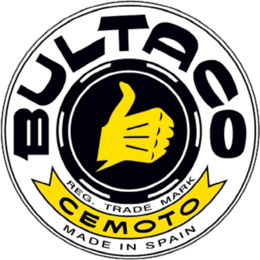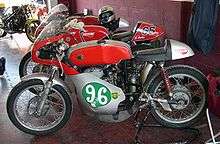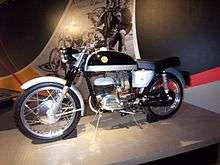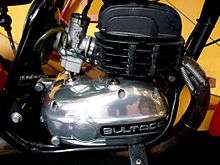Bultaco
 Built to go | |
| Industry | Motorcycle |
|---|---|
| Fate | dissolved |
| Founded | 1958 |
| Defunct | 1983 |
| Headquarters | Barcelona, Spain |
Key people | Francisco Xavier Bultó |
| Products |
Bultaco Tralla 101 (1959) Bultaco Sherpa (1960) trials bikes Bultaco Pursang (1965) Motocross bikes Bultaco Metralla Bultaco Alpina Bultaco Frontera Bultaco Mercurio (1960) Bultaco Matador Bultaco Astro Bultaco El Montadero Mk II Bultaco El Tigre (Other Models) Bultaco Streaker, Bultaco Mini (mini-bike), Bultaco Lobito, Bultaco Pomeroy - others by model number, also see Spanish Page for other details es:Bultaco. |
| Website |
www |

Bultaco was a Spanish manufacturer of two-stroke motorcycles from 1958 to 1983. In May 2014, a new Bultaco was announced, and the company will be selling electric-powered street motorcycles from 2015. The R&D department will be based in Madrid while the factory will be located in Barcelona. [1]
Origins
The origin of the Bultaco motorcycle company dates back to May 1958. Francesc "Paco" Bultó was a director of the Montesa motorcycle company founded in 1944.[2] After several years of steady growth and road racing success, in 1957 Montesa moved to larger facilities.[2] The move was protracted, disrupting production and was followed by a downturn in the Spanish economy.[2] This slump brought to a head disagreements between Bultó and the other senior director Pere Permanyer.[2] As an economy measure, Permanyer (the majority shareholder) felt that the company should withdraw from racing. Bultó, the driving force behind the racing program and responsible for much of the company’s technical expertise was vehemently opposed. Failing to reach a compromise, Bultó decided to leave Montesa to concentrate on his other business interests.[2] Perhaps unsurprisingly, the majority of Montesa's racing department left shortly afterwards as well.[2]
Bultaco is formed
The suggestion to form a new company is said to have come a few days later when Sr. Bultó was invited to a meeting by several of the former staff of Montesa's racing department. Keen to return to racing, they persuaded him that their greatest hope lay in forming a new company.[2] Setting up shop in very primitive conditions at an old farm owned by Bultó, things developed quickly. On March 24, 1959 Bultaco held a press day and launched its first bike, the road-going 125cc Bultaco Tralla 101, named after a Spanish word for whip.[2][3] Just two months later Bultaco entered its first Spanish Grand Prix taking seven of the first ten places.[2]
The company name and logo
"Bultaco" comes from combining the first four letters of Sr. Bultó's surname with the last three of his nickname "Paco".[2] The name was a suggestion of one of Bultaco's premier racers, and close friend of Sr. Bultó, John Grace from Gibraltar. CEMOTO is an acronym for "Compañia Española de Motores". The other part of company logo, the "Thumbs up" symbol, came after Sr. Bultó witnessed British motorcycle racer David Whitworth giving the signal to his pit crew to signify that all was well.[2] Sete Gibernau used to have this on the back of his crash helmet when he raced MotoGP.
In 1998, rights to the Bultaco name were purchased by Marc Tessier, who used it to help launch a range of purpose-built trials motorcycles from his company Sherco Moto S.A.R.L. The bikes were initially named Bultaco Shercos. In 2000, the bikes became 'Sherco by Bultaco', and in 2001 the Bultaco name was dropped altogether. The US trademark is now owned by HDW Enterprises, parent company of a parts and repair specialist for vintage Bultacos.[4][5]
Notable products


Although they made road and road racing motorcycles, the company's area of dominance was off-road, in motocross, enduros, and observed trials competition.
Perhaps the most famous Bultaco model is the Sherpa T, a trials bike, which revolutionised the sport in the 1960s. At that time trials was almost exclusively a British sport using big heavy four-stroke machines. Irish trials ace Sammy Miller teamed with Bultó to produce a lightweight two-stroke machine which, overnight, rendered the heavy four-strokes obsolete. Miller won the gruelling Scottish Six Days Trial in 1965, and then repeated the feat with wins in 1967 and 1968. He also claimed the European Trials Championship in 1968 and 1970. This coincided with and, perhaps, stimulated the growth in the popularity of trials in Europe and later the USA, which provided a lucrative market for Bultaco in the years to come. Bultaco dominated the World Trials Championship in the 1970s, winning the title eight times, and winning the Scottish Six Days Trial four times.
Bultaco's premier model in the USA, the Pursang, was an excellent handling and powerful 250 cc competition model that could readily compete in virtually any type of speed-based off-road competition. In later models, this was expanded to 125 cc, 360cc and 370 cc. Other models, such as the Sherpa T (trials), the Astro (flat tracker) and the Matador (trail bike), provided more targeted approaches to specific types of races. Some believe that the "T" in Sherpa T is an oblique and polite credit to Sherpa Tensing Norgay, who was Sir Edmund Hillary's indefatigueable climbing companion during his famous ascent of Everest.
Bultaco motorcycles were mainly powered by single-cylinder, air cooled, two-stroke engines, but they also made water cooled powerplants. The rider was required to mix the oil and gasoline manually. Built in Barcelona, Spain, Bultaco motorcycles were exported throughout the world, but their largest market ultimately became the USA, allowing aspiring racers to purchase legitimately competitive motorcycles without modification.
Due to industrial unrest and market pressures, Bultaco production closed in 1979. The factory reopened in 1980, but closed again in 1983. A new Bultaco was announced mid-2014, and is planning to begin sales in 2015.[1]
MotoGP star, Sete Gibernau is the grandson of the founder of Bultaco, Paco Bultó. Legend has it that Mr. Bultó asked to be buried "with his Bultaco t-shirt and his moustache properly waxed."
References
- 1 2 "Power sports business - Bultaco to unveil high-performance electric motorcycle". 27 May 2014. Retrieved 28 May 2014.
- 1 2 3 4 5 6 7 8 9 10 11 Walker, Mick (1986). Spanish Post-war Road and Racing Motorcycles. London: Osprey Publishing Ltd. ISBN 0-85045-705-X.
- ↑ Phillip Tooth (April–May 2009). "50 Years of Bultaco". Motorcycle Classics. Retrieved 2009-08-05.
- ↑ http://www.trademarkia.com/bultaco-cemoto-75768327.html
- ↑ http://www.bultaco.com/
External links
| Wikimedia Commons has media related to Bultaco motorcycles. |